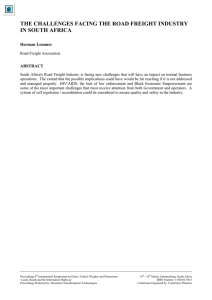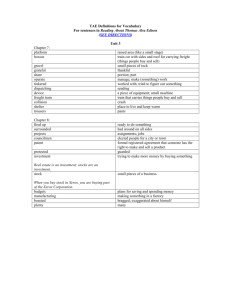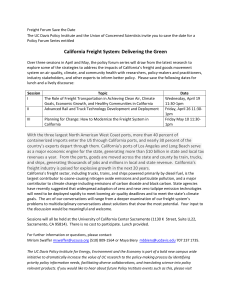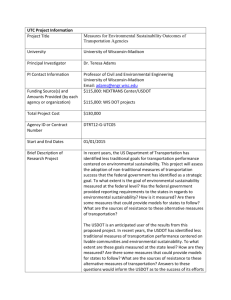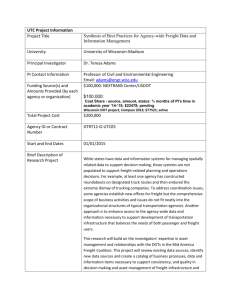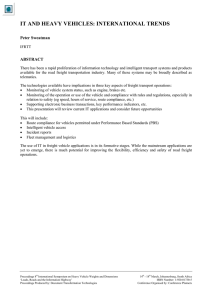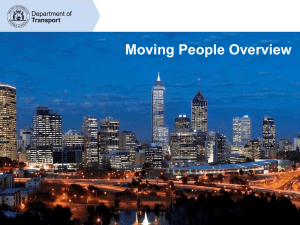TRANSPORTATION RESEARCH G REPORT
advertisement
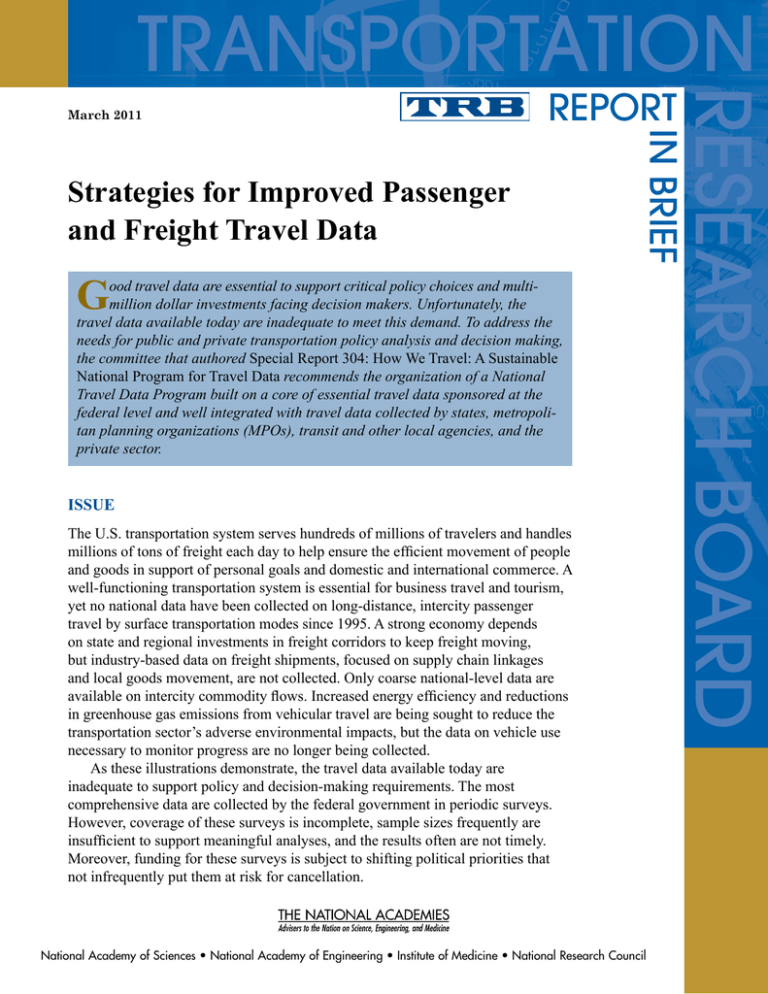
TRANSPORTATION REPORT IN BRIEF Strategies for Improved Passenger and Freight Travel Data RESEARCH BOARD March 2011 G ood travel data are essential to support critical policy choices and multimillion dollar investments facing decision makers. Unfortunately, the travel data available today are inadequate to meet this demand. To address the needs for public and private transportation policy analysis and decision making, the committee that authored Special Report 304: How We Travel: A Sustainable National Program for Travel Data recommends the organization of a National Travel Data Program built on a core of essential travel data sponsored at the federal level and well integrated with travel data collected by states, metropolitan planning organizations (MPOs), transit and other local agencies, and the private sector. ISSUE The U.S. transportation system serves hundreds of millions of travelers and handles millions of tons of freight each day to help ensure the efficient movement of people and goods in support of personal goals and domestic and international commerce. A well-functioning transportation system is essential for business travel and tourism, yet no national data have been collected on long-distance, intercity passenger travel by surface transportation modes since 1995. A strong economy depends on state and regional investments in freight corridors to keep freight moving, but industry-based data on freight shipments, focused on supply chain linkages and local goods movement, are not collected. Only coarse national-level data are available on intercity commodity flows. Increased energy efficiency and reductions in greenhouse gas emissions from vehicular travel are being sought to reduce the transportation sector’s adverse environmental impacts, but the data on vehicle use necessary to monitor progress are no longer being collected. As these illustrations demonstrate, the travel data available today are inadequate to support policy and decision-making requirements. The most comprehensive data are collected by the federal government in periodic surveys. However, coverage of these surveys is incomplete, sample sizes frequently are insufficient to support meaningful analyses, and the results often are not timely. Moreover, funding for these surveys is subject to shifting political priorities that not infrequently put them at risk for cancellation. National Academy of Sciences • National Academy of Engineering • Institute of Medicine • National Research Council STUDY SCOPE The Executive Committee of the Transportation Research Board (TRB) requested this study, with funding provided by TRB, the Research and Innovative Technology Administration (RITA) and the Federal Highway Administration of the U.S. Department of Transportation (USDOT), and the American Association of State Highway and Transportation Officials through the National Highway Cooperative Research Program. The expert committee formed by TRB and the Committee on National Statistics to conduct the study was charged with assessing the current state of travel data at the federal, state, and local levels and defining an achievable and sustainable travel data system that could support public and private transportation decision making. The primary goal was to develop a strategy for structuring, conducting, and funding the collection of critical travel data. The study is national in scope, recognizing that travel data are collected and used at multiple geographic levels and by multiple sectors. It covers all travel modes, with a focus on measuring the performance of the transportation system as a whole. WHAT’S THE SOLUTION? To support the wise use of public resources for transportation, particularly in a time of slow growth and massive budget deficits, a National Travel Data Program should be organized and sustained, built on a core of essential travel data whose collection is sponsored at the federal level and well coordinated with travel data collected by states, MPOs, transit and other local agencies, and the private sector. To manage and track the development and implementation of the program, a multiyear plan should be designed to assure Congress, the USDOT’s data partners, and constituents that the National Travel Data Program is moving ahead. Logically, the responsibility for leading this effort must reside with the USDOT, despite its past failures to develop a comprehensive and effective travel data program, because these data are essential to its mission. The Secretary of Transportation should assume a strong leadership role, with program design and coordination being carried out by RITA and its Bureau of Transportation Statistics (BTS), the federal statistical agency for transportation, which already has a data collection and coordination mandate. A National Travel Data Program Advisory Council, broadly representing major travel data constituencies, should be formed to provide strategic advice directly to the Secretary of Transportation. RITA, in collaboration with its data partners, should invest aggressively in research and testing of new methods for data collection, integration, management, and dissemination. These new methods should include continuous data collection and greater use of technology. The additional cost of collecting the data required is estimated to be in the range of $9–$14 million annually, and additional funds would be needed for BTS’s coordination role. The next reauthorization of surface transportation legislation offers the opportunity to secure the necessary funding. DETAILED FINDINGS AND RECOMMENDATIONS Concept of a National Travel Data Program Addressing critical policy and investment issues, particularly in today’s highly constrained funding environment, requires a strategic, interlinked system of passenger and freight travel data. A strong federal role is the necessary foundation upon which to organize and combine travel data from numerous sources into a coherent national program that is well integrated in terms of data architecture (i.e., the framework and relational structure), timing, and methods of data collection and sharing. Collaborations and Partnerships Developing the next generation of passenger and freight travel data surveys and data collection activities will require the active participation and sustained support of many data partners. Private sector data providers are necessarily key partners because they generate, aggregate, and disseminate data essential to transportation decisions. Thus they can and must play an important role in the development of a National Travel Data Program. The USDOT should work cooperatively with public agencies at all governmental levels, private-sector data providers, and professional and nonprofit associations to organize and implement a National Travel Data Program. The proposed program would advance the current travel data collection system by employing more consistent data definitions, stronger quality controls, better integration of data sets, and more strategic use of privately collected data. A process for working collaboratively and on a continuing basis with states and MPOs is needed to develop more common formats so that state and regional travel data can be better integrated and aggregated across jurisdictions for analysis and decision making. Opportunities for partnering with the private sector to derive mutual benefits should be pursued so that private-sector data can be accessed and used while protecting proprietary interests and leveraging private-sector expertise in areas such as data collection, aggregation, display, and dissemination. Organization and Leadership A successful National Travel Data Program that serves policy makers and planners will require the alignment of leadership, methods, funding, and understanding of market requirements. The USDOT remains the logical and most appropriate agency to spearhead such a program because of the central relationship of good national travel data to its mission. The leadership role necessary to the success of the proposed National Travel Data Program at the federal level should be assigned to the Secretary of Transportation to ensure that the data needs of the USDOT and the nation are met. RITA and BTS have the appropriate mission and mandate to carry out the design and management of the proposed program. Congress should provide the necessary funding and hold the department accountable for making progress toward developing the needed data. New Approaches to Data Collection, Integration, and Analysis Realizing the vision of a well-integrated, coordinated National Travel Data Program will require addressing many significant barriers to data collection, integration, and sharing. Traditional methods of collecting data through large-scale, periodic surveys need to be adapted to address issues of public acceptance and take advantage of evolving technologies and data collection approaches. RITA, through BTS and in collaboration with its data partners, should aggressively invest in the design and testing of alternative methods for data collection, integration, management, and dissemination. A major redesign effort, for example, will be required if a new supply chainfocused freight survey is to be mounted and other key gaps in freight travel data filled. Sufficient and Sustained Funding Funding for federal travel data programs has been both limited, given the need for data, and inconsistent, threatening the existence of some key program components and causing the elimination of others. The proposed National Travel Data Program should receive sustained funding for its core activities, estimated by the committee to be on the order of $150–$200 million over the next decade—an annual average of $15–$20 million. The proposed funding represents a sustained increase of about $9–$14 million over current annual federal spending of about $6 million on core travel data collection activities. Securing this funding would provide support for the core national passenger and freight travel data surveys and the recommended design and development effort. In addition, BTS will need funding to fulfill its data coordinating role and to establish the national clearinghouse and data archiving function to facilitate data integration efforts. Increased setasides for data collection by states and MPOs will also be essential to ensure effective collaboration among these partners. Constituent Support Current federal travel data programs fail to fully meet the needs of their customers, and data users are widely dispersed and have no systematic mechanism for voicing their needs. A National Travel Data Advisory Council representing the major travel data constituencies should be formed to provide strategic advice to the Secretary of Transportation on the design and conduct of the National Travel Data Program and on emerging data needs. Management and Accountability An implementation plan establishing action steps, roles and responsibilities, and milestones is needed to ensure accountability to those who fund, develop, and use the National Travel Data Program. The USDOT should develop a multiyear plan for implementing the National Travel Data Program in collaboration with its data partners; move rapidly to take the necessary first steps to put the plan into operation; and report biennially to Congress, its data partners, and its constituents on progress made. CONCLUSION The nation depends on its transportation system. Managing the performance of this system depends on good data, the foundation for prudent and sound decisions. The USDOT should seize the opportunity to make substantial improvements in national travel data to support more effective management of the transportation system. With billions of dollars at stake, the investment of the modest increment in funding to ensure better outcomes as recommended in this study is both necessary and prudent. Committee on Strategies for Improved Passenger and Freight Travel Data: Joseph L. Schofer, Northwestern University, Evanston, Illinois, Chair; Joseph G. B. Bryan, Halcrow, Cambridge, Massachusetts; Anne P. Canby, Surface Transportation Policy Partnership, Washington, D.C.; Anand Desai, Ohio State University, Columbus; Mortimer L. Downey III, Parsons Brinckerhoff, Washington, D.C.; Lance R. Grenzeback, Cambridge Systematics, Inc., Cambridge, Massachusetts; Hermann Habermann, Independent Consultant, Arlington, Virginia; Timothy A. Henkel, Minnesota Department of Transportation, St. Paul, Minnesota; Charles E. Howard, Jr., Puget Sound Regional Council, Seattle, Washington; James M. Lepkowski, University of Michigan, Ann Arbor; Daniel C. Murray, American Transportation Research Institute, St. Paul, Minnesota; Alan E. Pisarski, Independent Consultant, Falls Church, Virginia; Steven E. Polzin, University of South Florida, Tampa; Johanna P. Zmud, The RAND Corporation, Arlington, Virginia. NRC Staff: Stephen R. Godwin, Director, Studies and Special Programs, Transportation Research Board; Constance F. Citro, Center Director, Committee on National Statistics; Nancy P. Humphrey, Study Director, Transportation Research Board; Thomas J. Plewes, Senior Program Officer, Committee on National Statistics This report brief was prepared by the National Research Council on the basis of the committee’s report. Permission granted to reproduce this brief in its entirety with no additions or alterations. How We Travel: A Sustainable National Program for Travel Data is available from the Transportation Research Board, 500 Fifth Street, NW, Washington, DC 20001 (telephone 202-334-3213; fax 202-3342519; or e-mail TRBsales@nas.edu). Copyright 2011 The National Academies 500 Fifth Street, NW Washington, DC 20001 www.TRB.org
